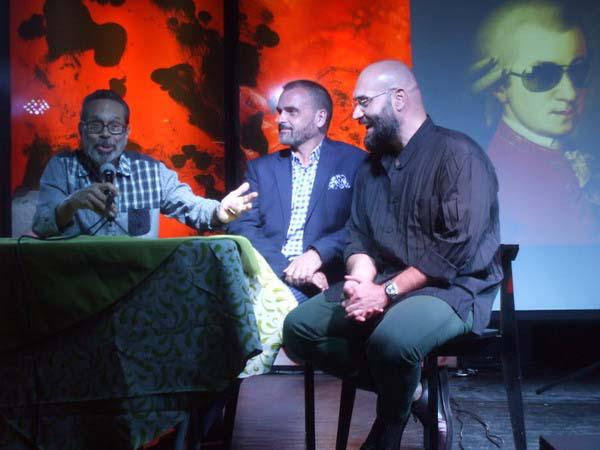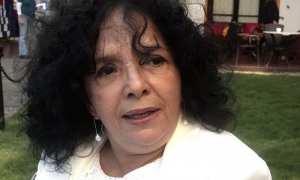
Four internationally renowned countertenors smiled good-naturedly when they heard the phrase “men with women’s voices,” during a press conference for the First World Countertenors Festival (September 30-October 8) organized by maestro Leo Brouwer.
Hours before their concerts, Xavier Sabata (Con che suavitá) from Spain; Italy’s Riccardo Angelo Strano (Héroes y amantes), Daniel Taylor (Handel love duets) from Canada and Artur Stefanowicz (Mozart & Porpora, il delirio) of Poland, refuted the assertion.
Sabata explained that “some people have this idea, but it's not so. Being a countertenor is about having a vocal quality, the highest register, and this Festival is recognition of that.”
”This misconception,” stated Strano, “still means that we have to work hard to insert ourselves in the field of music. That’s why this festival, the only one of its kind in the world, organized by a talent such as maestro Brouwer, is so important.”
Commenting on the Festival, Daniel Taylor from Canada confessed that he had thought, “It would be like a vacation in Havana, but after seeing the names of my colleagues also participating, I was stunned. In a time of so much diversity and such little inclusion, the fact that we could be here at the invitation of maestro Brouwer, makes this a beautiful moment for us.”
AN ASIDE WITH STEFANOWICZ
Following the press conference, Granma International spoke briefly to countertenorArtur Stefanowicz, with an extraordinary international career spanning over 20 years.
After graduating from the Fredric Chopin Academy of Music in Warsaw, he began singing outside of his native Poland, in Paris, at the Théâtre du Châtelet; Berlin in the Deutschen Staatsoper; at London’s English National Opera; and the New York City Opera.
He has a broad repertory, specializing in Mozart, and featuring works by Monteverdi, Scarlatti, Stravinsky, Pergolesi, Vivaldi, Handel, and Porpora.
During the Festival he offered a concert in Havana’s Martí Theater (October 1) accompanied by members of Cuba’s Higher Institute of Art’s Symphony Orchestra in collaboration with the Liceum Mozartiano de La Habana, entitled Mozart & Porpora, il delirio, the kingdom of Baroque, with a repertory perfectly suited to the countertenor’s voice.
A program of pieces from the 17th and 18th century…
Maestro Brouwer asked me to put together the program, to bring some Mozart and the lesser known Porpora. It was obvious to me, Mozart was my first album more than 25 years ago and Porpora is one of my most recent recordings, so for me it’s a fantastic combination. A full circle, Mozart at the start and Porpora at the end. I should say that in truth I’m ending my career. I’m the oldest here for instance.
Age verses voice?
Both have advantages, you start getting older and so does your voice. You have to be more selective with what you are going, or are able, to sing. It’s a decision you’ve got to make.
Why did you begin your career with Mozart?
I’m from Poland, where the Baroque period almost never existed, and I had to find what worked for my voice. In 1987 I was still a student and German countertenor Kowalski recorded arias by Mozart and I was fascinated by it, a technique and voice completely different to previous countertenors like Bowman or Esswood; whose voices sounded more like that of a woman singing in falsseto. And secondly, I came across an announcement for Vienna’s International Mozart Contest (1990) to promote countertenors. It was a popular event spanning Mozart’s entire career with singers from across the world, and I decided to compete, and so I started to study Mozart and happened to win the contest. I think it was fate. Afterward I decided to record a CD and that’s how I began. That’s why Mozart. My voice is right for this type of music.
Mozart wrote for castrato singers…
That’s right. For the voice of castrati which is similar to that of a countertenor. The most famous was Carlo Broschi, also known as Farinelli (1705-1782). Nowadays, we aren’t castrated; we use a technique to sing like the castrati did in their time. The range is the same, but it’s difficult to talk about similarities because no one today has ever heard a castrato sing,there’s a great void in the history of the music. There were no castrati in the 19th century. It’s hard to describe how they sounded, but looking at the scores, the music, you could say that what we do now is similar to how they sounded.
Going back to the beginning: during the press conference you all laughed when they mentioned women’s voices in men’s bodies…
“Yes, it’s difficult for someone who has never heard a countertenor before. If you close your eyes it sounds like a woman’s voice, it’s closer to the female voice. In today’s world we are recognized as masculine voices, which is what we have fought for, and that’s very important. Let me tell you a story. I remember my father, who was a sailor. He’d never heard me sing before. He came home one day and I put on one of my CDs for him and he said: no, no, that’s not you; it’s got to be a woman. I told him that it was me. It’s the normal reaction, that’s why we laugh.
With his immense summoning power, maestro Leo Brouwer has been gifting Havana for almost a decade, with new festivals to challenge and delight music lovers.
The renowned Cuban composer sums up the significance of this First World Countertenors Festival in two sentences: “Bringing these wonderful artists together in this city, with their unique voices of different tones and non-standard, non cliché repertories, is fantastic; and let’s not forget that the perfect repertory for a countertenor was developed in the Baroque period and is a quality seal, and that’s where the challenge lies for contemporaries.






